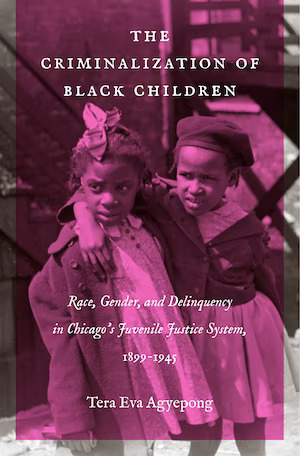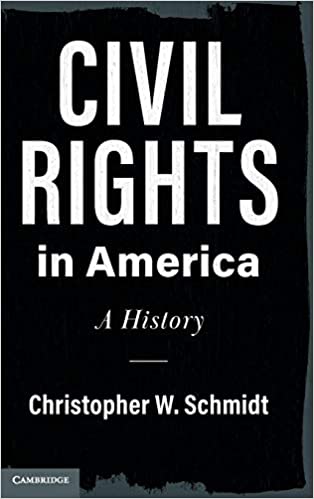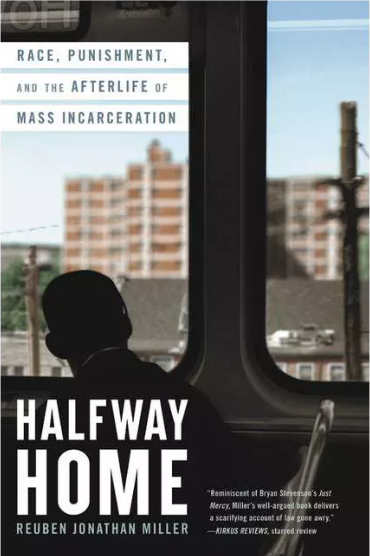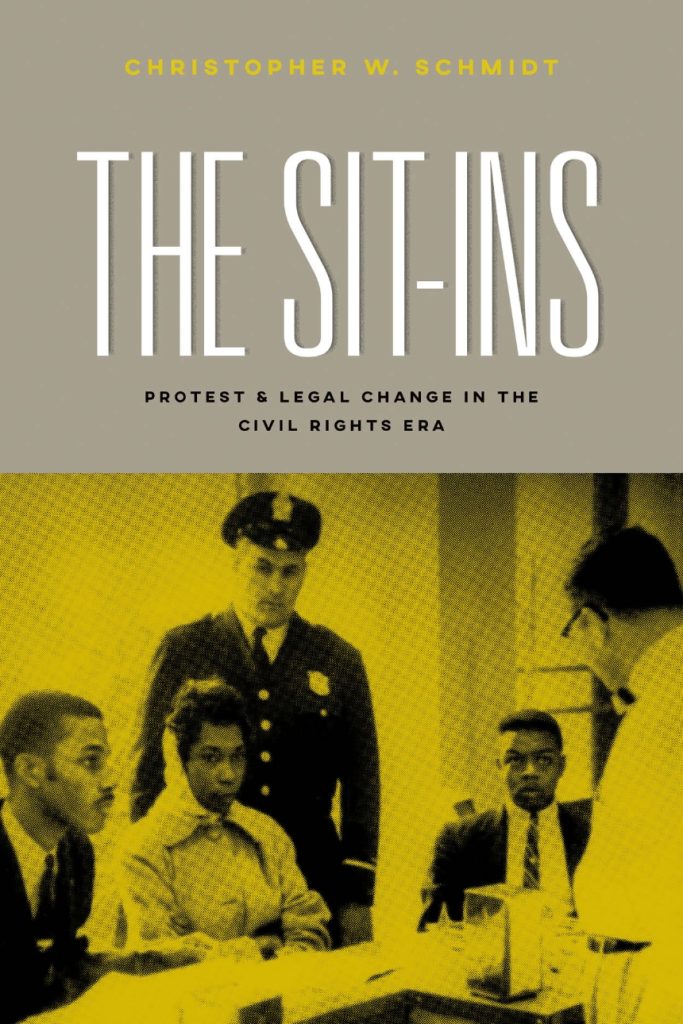Since its founding in 1952, the ABF has been steadfast in advancing research that breaks down the barriers to a more just society. Throughout the decades, many of our ABF scholars have produced groundbreaking research on the legal and social inequities experienced by Black Americans in particular.
In celebration of Black History Month, we have compiled a list of summaries of ABF Researchers’ most recent work that focuses on the experiences of Black Americans at the intersections of law and society.
1. The Criminalization of Black Children: Race, Gender, and Delinquency in Chicago’s Juvenile Justice System, 1899 – 1945 (The University of North Carolina Press, 2018) by Tera Agyepong

Chicago was the epicenter of a Progressive-era movement that centered around the idea that children were inherently innocent and were entitled to a justice system separate from adults. But as southern Black migrants entered the city and faced widespread discrimination, there were few places where Black children in distress could receive care. This primed the emergence of a juvenile justice system in which Black children were seen as delinquents before they even formally entered the system. In this book, Agyepong shows how the story of the racialized criminalization of Black children is also the story of the history of race relations in modern America.
2. Not All Black Lives Matter: Officer-Involved Deaths and the Role of Victim Characteristics in Shaping Political Interest and Voter Turnout (Perspective on Politics, 2021) by Traci Burch
This article studies the significance of the visibility of police-involved deaths on political interest and voter turnout. Participants’ responses in a survey showed that political interest and voter turnout were higher among the group exposed to police violence where the Black victims displayed a low level of threat. Exposure to this scenario was especially impactful among Black respondents under 40. Burch believes that these results can be used to help researchers understand the role that journalists, activists, and watchdog groups can play in how the public frames Black victims of police violence and how they mobilize to hold politicians and police departments accountable.
3. Civil Rights in America: A History (Cambridge University Press, 2020) by Christopher Schmidt

Generations of Americans have argued about what it means to live in a country that promises to protect civil rights. Schmidt’s book is the first to trace how the meaning of “civil rights” has changed in the U.S., from the Civil War through today. While the term is often linked to Black Americans and the struggle for equal protection under the law, Schmidt argues that there has never been a fixed definition of civil rights. His book charts how the different ideas about civil rights have developed over time, and how the ideas have been used as leverage for social, political, and legal action. This ongoing struggle to define civil rights and use it for one’s own purposes, Schmidt argues, has been central to our ongoing efforts to make the United States a more equal and just society.
4. Halfway Home: Race, Punishment, and the Afterlife of Mass Incarceration (Little, Brown and Company, 2021) by Reuben J. Miller

In the U.S., there are an estimated 45,000 laws and policies that target people with criminal records. These laws make it hard for the formerly incarcerated to find housing, jobs, education, and other resources needed to reestablish themselves in society. Miller spent 15 years following 250 incarcerated and formerly incarcerated men and women, their families, and friends as they navigated the intersections of race, poverty, crime control, and social welfare policy in Chicago. Informed by these experiences, his own family’s experiences, and his time as a chaplain at Chicago’s Cook County Jail, Miller uncovers that “debt-serving” for one’s crimes does not end after serving time in prison.
5. Dual-Process Theory of Racial Isolation, Legal Cynicism, and Reported Crime (PNAS, 2018) by John Hagan et al.
In predominately Black neighborhoods in Chicago marked by elevated levels of legal cynicism – which stems from a shared belief that law enforcement is ineffective and ill-equipped to ensure public safety – a paradox emerges. Despite residents’ skepticism about the police’s ability to respond adequately, there is a high number of reported 911 calls. This phenomenon can be attributed to a combination of conscious and subconscious legal cynicism, as well as the failure of policymakers to address community concerns about policing and the absence of viable alternatives. Understanding this dynamic is crucial to understanding policing relations at a time when Black communities are calling for comprehensive reforms, if not the abolition, of police forces that have failed to address the root causes leading to legal cynicism.
6. Measuring and Mitigating Racial Disparities in Tax Audits (Stanford Institute for Economic Policy Research) Jacob Goldin et al.
Jacob Goldin and collaborators studied the difference in Internal Revenue Service (IRS) audit rates between Black and non-Black taxpayers. Despite the IRS race-blind audit selection, they found that Black taxpayers are audited at 2.9 to 4.7 times the rate of non-Black taxpayers. The main source of this disparity is that Black taxpayers who claim the Earned Income Tax Credit (EITC) are audited more. These results highlight how seemingly nonbiased choices about algorithmic design can have an unintended bias.
7. The Black-White Student Debt Gap Among Law Student Graduates (The Practice) by Meghan Dawe
This article sheds light on the unequal impact of the student debt crisis, particularly its disproportionate effect on Black Americans, further exacerbating the longstanding racial wealth gap in the United States. Through a comprehensive case study focusing on law school graduates, Dawe’s data reveals that Black students, with a specific emphasis on Black women, face the most significant burden of student debt when pursuing legal education. This disparity persists even after considering influential factors such as the ranking of the law school and available financial aid. Importantly, this study underlines how the escalating costs of graduate degree programs serve as a systemic deterrent for Black students seeking to pursue law degrees, raising critical questions about equitable access to higher education and its long-term consequences on racial wealth disparities.
8. The Sit-Ins: Protest & Legal Change in the Civil Rights Era (University of Chicago Press, 2018) by Christopher Schmidt

This book details the story of the lunch counter sit-in movements of 1960, which began with four African American college students fed up with the “separate but equal” constructs controlling public spaces in the deep Jim Crow South and turned into a movement with thousands of participants that transformed the 1960s struggle for racial equality. Behind these now-iconic scenes of Black college students sitting in quiet defiance at “whites only” lunch counters lies a series of underappreciated legal dilemmas – about the meaning of the Constitution, the capacity of legal institutions to remedy different forms of injustice in private and public spaces, and the relationship between legal reform and social change. Schmidt seeks to recount history with attention to how these student lunch counter protests sparked a more considerable debate over the meaning of the constitutional right of all Americans to equal protection of the law as it led up to the passing of the Civil Rights Act of 1964.
9. Before the Movement: The Hidden History of Black Civil Rights (Liveright, 2023) by Dylan C. Penningroth
In Before the Movement, Penningroth challenges the conventional narrative of the American civil rights movement. He dispels the notion that African Americans only engaged with the legal system in the mid-20th century, revealing forgotten sources that demonstrate their involvement in legal matters dating back to the time of slavery. They adeptly navigated property, contract, inheritance, marriage, and association laws, incorporating these everyday rights into their lives. Penningroth offers a unique perspective on Black legal experiences, moving beyond the traditional focus on the Constitution and criminal justice system to present a more comprehensive view of Black existence—both connected to and distinct from the broader civil rights movement.
###
About the American Bar Foundation
The American Bar Foundation (ABF) is the world’s leading research institute for the empirical and interdisciplinary study of law. The ABF seeks to expand knowledge and advance justice through innovative, interdisciplinary, and rigorous empirical research on law, legal processes, and legal institutions. To further this mission the ABF will produce timely, cutting-edge research of the highest quality to inform and guide the legal profession, the academy, and society in the United States and internationally. The ABF’s primary funding is provided by the American Bar Endowment and the Fellows of The American Bar Foundation.
